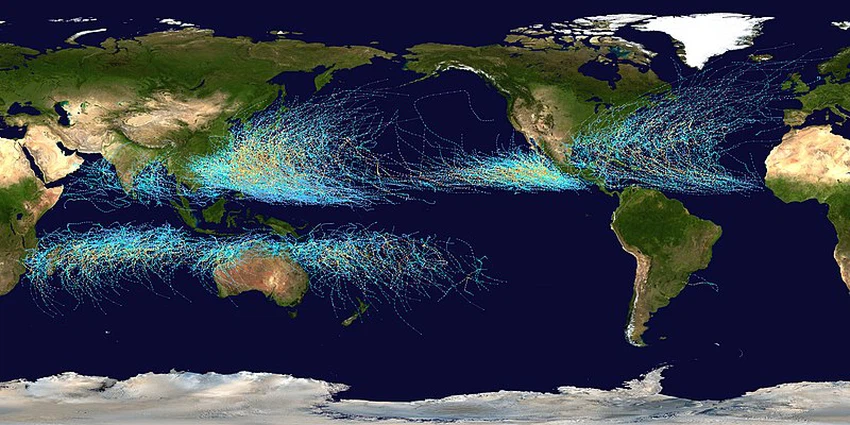Scientifically: How are hurricanes formed and why they do not grow above the equator and cannot even cross it?
Weather of Arabia - Tropical cyclones are considered among the most violent and destructive weather phenomena on the planet Earth, and the term hurricane is usually associated with floods and landslides of varying intensity, whether of the lowest or maximum degree (super typhoon). Tropical cyclones are active near the equator, specifically within a framework The orbits are similar to their seasons, but they cannot form above or even cross the equator.
First: How do tropical cyclones arise?
We begin with you about the mechanism of tropical cyclone formation around the world. There are usually two main mechanisms for the formation of tropical cyclones. The first is when bundles of cumulus thunderclouds move from the African continent towards the surface of warm ocean waters. The thunderclouds begin to feed on the latent thermal energy and water vapor that is produced from the surface of the ocean. Ocean water, then the clouds grow vertically and multiply additionally and the atmospheric pressure decreases until the winds begin to rotate at high speeds around the center of the cumulonimbus clouds and then the final stages of a tropical cyclone officially form.
The other mechanism for the formation of tropical cyclones is as a result of the temperature of the water body rising to more than 26 degrees Celsius, then water vapor begins to rise towards the upper layers of the atmosphere, cools and condenses, and then cumulonimbus clouds begin to grow and develop until they become high in height, feeding on the warmth of the water surface and the vapors emitted as the air density decreases. The air pressure decreases to reach hurricane values, then the winds rotate regularly and at high speed around the center of low air pressure, announcing the formation of a hurricane.
Second: Despite the availability of high temperature and abundant water vapor at the equator, why do hurricanes not form above the equator?
Although the equator region enjoys very high temperatures throughout the year, and water vapor and latent thermal energy are abundant, it is not possible for tropical cyclones to form in the equator region, and they rarely even come close to it. The scientific reason behind this is due to a physical force that affects the equator region. Objects above the Earth's surface are called the Coriolis force, which is a force that results from the Earth's rotation around itself, causing the air to deflect in the atmosphere instead of rotating in a straight pattern. The deflection of the air is towards the right in the Northern Hemisphere and towards the left in the Southern Hemisphere.
But what does the Corilois force have to do with the fact that hurricanes do not form above the equator?
Tropical cyclones need the Coriolis force because it helps control the direction in which they rotate. For example, in the Northern Hemisphere, air moving to the right results in a movement that rotates counterclockwise, and the opposite happens in the Southern Hemisphere, and this change in wind patterns results from the Coriolis force, but At the equator, the Corilois force is zero (0), but it increases and its effect becomes stronger with increasing latitude.
This explains the inability of hurricanes to form above the equator due to the lack of influence of the Coriolis force, but the question may come to your mind: what if the hurricane was able to reach and cross the equator.
Hypothetically, even if a hurricane were able to advance to the equator and reach the other side of it (although this is impossible because the Coriolis force causes the paths of hurricanes to curve away from the equator as well), it would quickly dissipate and end up as a result of winds rotating in the opposite direction to the direction in which they are rotating. Winds around the hurricane when it was in its home country.
 A map showing the paths that hurricanes take around the world.
A map showing the paths that hurricanes take around the world.
God created the Public
Arabia Weather App
Download the app to receive weather notifications and more..



